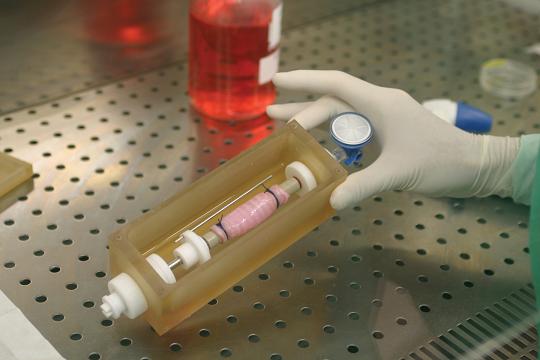A lot of things around us are made of plastic, but did you know that plastic commonly found in soda bottles can be made into a fully functional organ that can be transplanted into patients?
Human Organ is one of the most scarce medical resources. For example, in Canada last year, nearly 5000 Canadians were on waiting list for organ transplant, and about 200 people died while waiting for a transplant. What if YOU need transplant organ one day? Wouldn’t it be nice if there were a way to synthesize human organs from scratch? It turns out that stem cell research is the most promising solution to this problem.
So what are stem cells? Stem cells are cells that have the ability to self-renew and turn into specialized cells. Examples of stem cells include bone marrow cells and blood cells.
A couple of years ago, a patient named Andemariam Beyene had a tumor in his windpipe and was out of treatment options. His doctor Paolo Macchiarini came up with a radical idea: to build a new windpipe out of plastic and the patient’s own stem cells. This is a radical idea indeed. Who would think that something so common as plastic can save someone’s life?
Video about Mr. Beyene’s plastic trachea implantation:
http://youtu.be/_GyQWAiDu0w
The tissue engineers first obtained CT scans of the patient’s existing trachea and tailor-made the plastic trachea to ensure it matched precisely. They then seeded the plastic with patient’s bone marrow stem cells and placed it in a in an incubator containing nutrient solution(See Figure 1). Inside the incubator the windpipe was rotated like a rotisserie chicken to allow the cells to soak in the solution. Transcription factors were used to help force the stem cells to differentiate into trachea-specific cells while in the incubator.

Figure 1: windpipe being developed in incubator. Image from www.labbulletin.com
After two days, the semi-artificial organ was implanted into the patient’s body, where the cells continued to grow and differentiate with signals from the body. This way, the human body itself is used to promote its own regeneration.
Mr. Beyene is now tumor-free and breathing normally. In fact, he does not even need to take drugs to prevent organ rejection because his own cells are used to develop the transplant organ. On the other hand, if the transplant were a donated organ, his body may recognize the implanted organ as foreign and starts attacking it. In that case, he would need to take drugs to suppress his immune system to prevent his body from destroying the foreign tissue.
As of today, only simple organs like windpipe have been made and transplanted, but the future of stem cell research is promising. It’s possible that in 10 years or so, complex organs built from stem cell will save your life!
